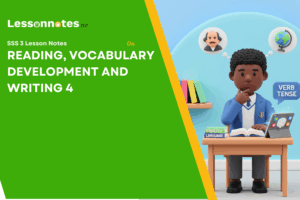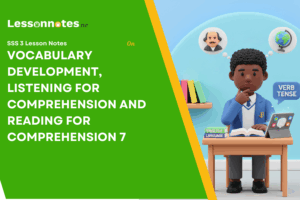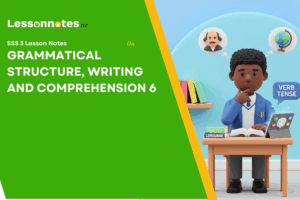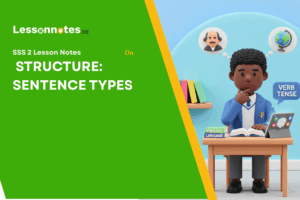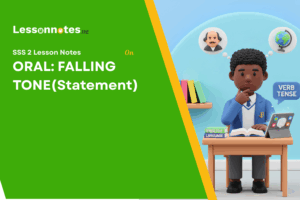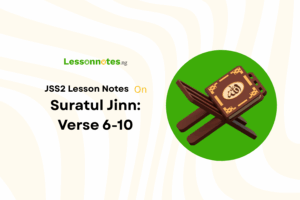Functions & Forms of Adjunct SS3 English Studies Lesson Note
Download Lesson NoteTopic: Functions & Forms of Adjunct
GRAMMATICAL STRUCTURE
An adjunct is a word or a group of words that forms a part of the meaning of the sentence. An adjunct functions like an adverb in a sentence. An adverb modifies a verb, another adverb or an adjective in a sentence. A word or group of words that function like an adverb within the sentence structure which normally tells us how, when, where, to what extent, under what condition, and why, the action of the verb is performed is called an adjunct. In linguistics, an adjunct is an optional, or structurally dispensable, part of a sentence, clause, or phrase that, if removed or discarded, will not otherwise affect the remainder of the sentence.
Take the sentence John helped Bill in Central Park on Sunday as an example.
- John is the subject of argument.
- helped is the predicate.
- Bill is the object argument.
- In Central Park is the first adjunct.
- On Sunday is the second adjunct.
More examples: Mr. John came here. I ate my food hurriedly. The teacher taught us yesterday. The old man takes his drug regularly. I left the book in the hostel. The following sentence uses adjuncts of time and place: Yesterday, Lorna saw the dog in the garden. It is possible to have a meaningful sentence without the inclusion of an adjunct. However, some sentences may not be meaningful if the adjunct is deleted. For example: a. Should I put the flask (on a table?) b. We went (for) our fees.
Forms and domains of adjunct
- An adjunct can be a single word, a phrase, or an entire clause. Single word; She will leave tomorrow. Phrase; She will leave in the morning. Clause; She will leave after she has had breakfast.
- An adnominal adjunct (adjunct as a noun phrase): the one that modifies a noun. E.g. The discussion before the game – before the game is an adnominal adjunct. The exercise before the match. We met last month.
- Adjuncts that modify adjectives and adverbs which are occasionally called ad adjectival and ad adverbial. E.g. very happy – very is an ” adjectival” adjunct. too loudly – too is an “adverbial” adjunct.
- Adjuncts may be a pure adverb or a prepositional phrase. Examples of pure adverbs are: How: well, quickly, quietly, etc. Where: here, there, inside, etc. When: today, always, soon, etc. To what extent: far, greatly, extremely, etc.
- Adjuncts may be a prepositional phrase. Examples of prepositional phrases as an adjunct: She is sleeping on the bed. The cat is under the table
Functions of Adjuncts
- Adjuncts tell you how an activity or event happened. For example: The girl sings melodiously.
- Adjuncts also indicate when an event occurred. For example: I visited my friend yesterday.
- Adjuncts also indicated where something happened. For example: Mr. John came here. Having discussed adjunct, it is imperative to talk briefly about disjunct and conjunct. The disjunct expresses the point of view or attitude of the speaker, while the conjuncts join two sentences or clauses thereby performing the function of a conjunction. Examples of disjunct Examples of conjuncts Honestly, luckily, personally, happily, definitely, certainly, etc. Moreover, however, nevertheless, similarly, incidentally, etc. Representing adjuncts Many theories of syntax and grammar employ trees to represent the structure of sentences. Various conventions are used to distinguish between arguments and adjuncts in these trees. In phrase structure grammars, many adjuncts are distinguished from arguments insofar as the adjuncts of a head predicate will appear higher in the structure than the object argument(s) of that predicate. The adjunct is adjoined to a projection of the head predicate above and to the right of the object argument, e.g.
READING
Reading To Paraphrase Dramatic works (comprehension) “Robbers invade Obioma’s Homepage 107. Paraphrase means a restatement of a text in different words. Often to clarify meaning. You construct each sentence (not each line) using your English expressions. A Paraphrase exercise expects the general ideas contained in the comprehension. Word or phrase that can replace it as used in the passage. take on – challenge, face, confront Uninhibited- freely unchanged, undisturbed realised- learnt discovered, found -out. Composed – relaxed, unruffled, calm, resuscitated- revive, bring back to life.
SPOKEN ENGLISH
Argumentative Essay: “The Home is Responsible for
the Unruly Behaviour of Teenagers in the Society.”
An argumentative essay requires you to present a subject to persuade your reader to agree with your point of view against another one. The essence of this type
An essay is an argument and its subject covers all forms of debate.
An argument may be developed to:
- prove a point
- present a viewpoint
- balance the two sides of an issue.
For examination purposes, the candidate must realise that all debates are
argumentative essays but not all argumentative essays are debates. Debates are framed in such a way that the writer should know the topic to be discussed, the people that would be around and possibly where the debate is taking place.
On the other hand, some topics merely require your view point. In this type of essay, you should write out the topic, underline it and start writing your views without addressing anybody.
Example: Write an essay presenting your points for or against the topic, ‘Day students perform
better than boarding students in examinations’.
The above is a good example of an ordinary argumentative essay. No audience is indicated and no greeting is necessary. All you need to do here is to write the topic and start your essay.
Evaluation
Write an essay on the topic.
- ‘The Home is responsible for the Unruly Behaviour of Teenagers in the Society’.
LISTENING FOR COMPREHENSION
SKILL FOCUS: PARAPHRASING A POEM
Poetry is not as difficult as it seems, but most people think it is. All you need to do is understand the language of poetry. You won’t be able to read doctor’s prescriptions because you don’t understand the medical terms used in writing those words. If you understand medical terms, you will be able to read any doctor’s prescription except if the doctor’s writing is very bad. The same rule applies to law and several other professions.
People think since poetry is written in the English language, they should be able to understand without stress. Some people also think poetry is difficult either to read or write, so they try to avoid it by all means.
Ad closed by Google
As I said in a previous class, poetry is a broad subject. You won’t be able to appreciate it unless you learn its requirements. The requirements for accessing poetry include a well-trained perceptive mind and a good understanding of rhetorical devices. If you can master these two requirements mentioned, you will be able to give meaning to a poem and paraphrase when you are required to.
Now to paraphrase a poem, you simply need to read, digest and understand it. Then write in simple terms what you think the poet is saying through the poem.
Practice with this today:
On this dirty patch
a tree once stood,
shedding incense of the infant corn:
its bough stretched across a heaven
brightened by the last fires of a tribe.
They sent surveyors and builders
who cut those trees,
planting in its place:
a huge senseless cathedral of doom.



